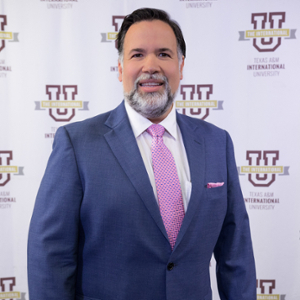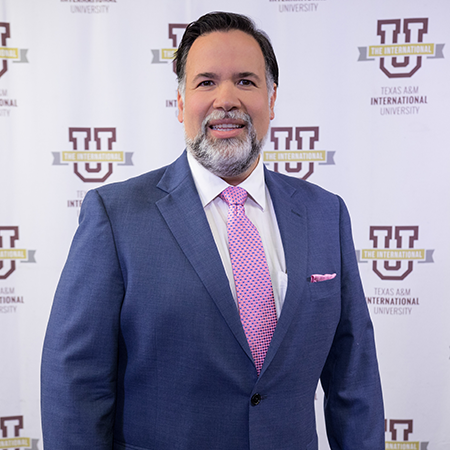TAMIU's Dr. Covarrubias Addresses Clean Transportation and Smart Border Technology at Binational Summit and Local Forum

Texas A&M International University's (TAMIU) A.R. Sanchez, Jr. School of Business Texas Center for Border Economic and Enterprise Development director Dr. Daniel Covarrubias participated in two recent events highlighting the transformation of cross-border logistics and sustainable transportation infrastructure.
NADBank Summit Panel on Clean Mobility and Economic Integration
Dr. Covarrubias joined industry leaders at the North American Development Bank (NADBank) Summit 2025 in San Antonio August 28, participating in the binational panel "Driving Growth: Clean and Efficient Mobility Catalyzes Economic Integration." The international discussion brought together cross-border transportation experts from both sides of the U.S.-Mexico border, including Juan Baez (CEO, Bali Express Services), Jorge Alberto Gutiérrez Topete (director, Sustainable Mobility Institute of Baja California), and Victor Salazar (International CCO, Trayecto), with moderation by Kari D. Bergman, CFA (associate director, Environmental Infrastructure Finance, NADBank).
The Summit panel explored opportunities and challenges in adopting zero-emission vehicles (ZEVs) for cross-border freight movement, drawing from TAMIU's NADBank-funded Electric Truck Cross-Border Drayage Comparative Pilot Study conducted with the Texas A&M Transportation Institute (TTI).
Covarrubias presented key research findings showing that while cross-border drayage movements in the Laredo-Nuevo Laredo corridor are technically suitable for electrification, significant barriers remain. Research revealed that battery electric vehicles (BEVs) could achieve cost payback with incentives through fuel cost reduction versus diesel and lower maintenance costs, yet higher capital expenditures and limited charging infrastructure along key corridors like I-35 and Loop 20 present real challenges for carriers.
"Our research confirms that the economics of clean transportation are improving, but the transition requires careful coordination," Covarrubias explained, "Carriers are interested in ZEVs to meet client sustainability demands and reduce operating costs, but they need the right mix of incentives, infrastructure investment, load and distance capacity, and realistic implementation timelines. This isn't about forcing change; it's about creating conditions where cleaner technologies make business sense."
Also present at the summit were TTI research colleagues David Salgado, Juan Carlos Villa, and Madhusudhan Venugopal who engaged with Summit participants about the ongoing binational research initiatives.
LC Global Logistics Center Keynote on Smart Ports and A.I.
On August 26, Dr. Covarrubias delivered a keynote address at Laredo College's (LC) Global Logistics Center Speaker Series, presenting "From Border Basics to Logistics Leadership: Laredo in the Next Era of Cross-border Logistics." The presentation focused on how Smart Ports of Entry, A.I. (artificial intelligence), and logistics technology companies are reshaping international trade.
"Students in Laredo are uniquely positioned to lead the transformation of cross-border logistics," Covarrubias told the audience, "The convergence of A.I., Smart Port technology, and innovative logistics platforms is creating unprecedented opportunities for our region to define the future of North American trade."
The keynote, which drew strong engagement from students, faculty, and local business community members, was hosted by LC president Dr. Minita Ramírez and the Global Logistics Center.
Building Binational Solutions for Continental Competitiveness
Both presentations emphasized the critical role of cross-border collaboration in addressing shared challenges. At the NADBank Summit, Covarrubias highlighted how binational cooperation on clean transportation infrastructure could create competitive advantages for the region while reducing emissions. At LC, he stressed the importance of developing local talent to manage increasingly sophisticated logistics systems.
"These events demonstrate the growing recognition that border communities aren't just crossing points, they're innovation hubs," Covarrubias noted, "Whether we're talking about electric trucks or A.I.-powered Customs processing, the solutions we develop in Laredo will shape continental trade for decades to come."
The presentations built upon themes from his recent work on Smart Ports of Entry, USMCA 2.0, and his book "Navigating the New Era of U.S.-México Trade," positioning sustainable infrastructure and technological innovation as key drivers of regional economic development.
For more information about Dr. Covarrubias's work or TAMIU's Texas Center research initiatives, including multiple NADBank-funded research projects on sustainable transportation infrastructure, visit http://texascenter.tamiu.edu, email Covarrubias at dcova@tamiu.edu, or call 956.326.2520.

